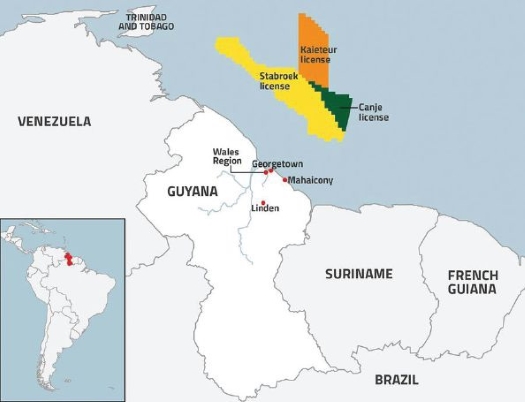Exxon accused of exploiting Guyana in oil deal
By Tariqah Shakir-Muhammad -Staff Writer- | Last updated: Feb 12, 2020 - 11:27:53 AMWhat's your opinion on this article?

|
Under the deal, Guyana could lose up to $1.3 billion per year which could be used for schools, hospitals, infrastructure and to repair crumbling sea walls, Global Witness argued in an early February report entitled “Signed Away.”
Global Witness interviewed Guyanese citizens last summer about the country’s high unemployment rate, sugar farms which have been forced to close, and the revenue needed to protect the country from sea level rise—a phenomenon largely driven by the climate crisis and activities like oil drilling.
“In Mahaicony, Guyana’s breadbasket on the coast, we were shown wide swathes of farm fields flooded with salt water,” the report reads. “The sea wall had collapsed, crops were ruined, livestock was getting sick, and it would be years before the land recovered. Money was desperately needed to rebuild coastal defenses.”

|
Patrick Galey, environment correspondent for Agence France Presse, tweeted that Guyana’s resources have been “plundered by oil barons.”
“Guyana’s loss. Humanity’s loss,” Mr. Galey wrote on Twitter.
Global Witness charged the rushed deal will cause Guyana to profit significantly less than other countries such as Mauritania, Mozambique and Israel. These countries allow shares for gas extraction, not oil. After discovering a new oil source in Guyana, Exxon negotiated with the country’s Natural Resources Minister Raphael Trotman concerning its Stabroek oil and gas exploration project license which began in 2016.
Exxon continues to struggle since stock market shares dropped to its lowest seen in a decade on Feb. 3, according to MarketWatch.
“Guyana’s urgent development needs—such as building new hospitals and schools, and protecting itself from rising sea levels that put 90 percent of the population at risk—will not be met by Exxon walking away with an extra $55 billion in its back pocket,” said Global Witness writer Jonathan Gant. “It is shocking that Exxon would seek such an exploitative deal in one of the Western Hemisphere’s poorest countries.”
Global Witness also believes Mr. Trotman may have had a conflict of interest during the deal because his political ally, Nigel Hughes, was a lawyer for Exxon. His firm has represented the company since 2009, but Mr. Hughes denies he worked on the Stabroek oil reserve deal.
Still, Global Witness called on Guyanese officials “to investigate the Exxon deal and the ministers involved, and to demand a new, fair license,” and that renegotiating the contract could boost the country’s budget.
“With an average extra $1.3 billion per year from Stabroek, Guyana could address the concerns of its people,” Global Witness reported. “The government’s total 2019 annual budget is $1.4 billion. With additional money from Stabroek, Guyana could double its annual $172 million health budget, $251 million education budget, $185 million infrastructure budget and still have $700 million left each year,” noted the report.
“Exxon’s Kaieteur and Canje licenses raise corruption red flags and should be investigated,” said Mr. Grant. “Given these problems and the threats to Guyana posed by the global climate emergency, Guyana should renegotiate the Stabroek license and then ban all new drilling in the country.”
The Global Witness report is available at globalwitness.org.
INSIDE STORIES AND REVIEWS
-
-
About Harriett ... and the Negro Hollywood Road Show
By Rabiah Muhammad, Guest Columnist » Full Story -
Skepticism greets Jay-Z, NFL talk of inspiring change
By Bryan 18X Crawford and Richard B. Muhammad The Final Call Newspaper @TheFinalCall » Full Story -
The painful problem of Black girls and suicide
By Charlene Muhammad -National Correspondent- » Full Story -
Exploitation of Innocence - Report: Perceptions, policies hurting Black girls
By Charlene Muhammad -National Correspondent- » Full Story -
Big Ballin: Big ideas fuel a father’s Big Baller Brand and brash business sense
By Bryan Crawford -Contributing Writer- » Full Story






 Click Here Stay Connected!
Click Here Stay Connected!








